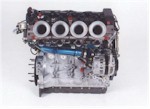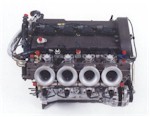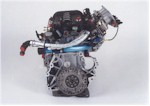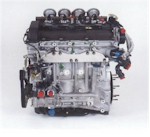300 HP NA SR20DE
Comments and Pictures from Ben Rockwell
The pictures below are of the SR20 engine that was used a few years
back in one of the European touring car championships. I received these pictures from a
friend in Japan who works for Nissan in the Motorsports Development Section. These photos
were released by Nissan for distribution.
This SR20 is normally aspirated and puts out around 300 hp.
It is a full race engine, and although basically similar to our SR20DE's, there are
significant differences. While many of use dream of turbo charging our normally aspirated
engines, with this engine Nissan did the reverse. That is, this engine is essentially the
turbo SR20DET from the GTi-R transformed into a normally aspirated engine.
Click on the thumbnails for larger view of each. For even greater
detail take a look at the "large" images, but beware, they ARE LARGE.
 |
The intake side of the engine. Large 665KB version
It uses a separate throttle body topped by a velocity stack for each cylinder. This setup
results in a intake runner length that is shorter and straighter than the stock setup. The
shorter length allows the engine to breathe easier at the high rpm's at which it operates
while racing. |
 |
The top of the engine from the intake side. Large 580KB Version
Notice that there are two sets of injectors, i.e. TWO per cylinder!!. Check out the
direct ignition system with separate ignition coils for each cylinder. This is probably
borrowed from the 200SX. The valve cover is embossed with the word Nissan on the
intake side and SR20 on the exhaust side. |
 |
The flywheel end of the engine. Large 692KB Version
If you look carefully (large image), you can see the code 54C cast into
the block. This is not the same block used by SR20DE engines. The 54C
block was used in the beast-like GTiR. SR20DE engines used the 53J code
blocks. This image also provides another view of the direct ignition, valve cover, and
velocity stacks. |
 |
The exhaust side of the engine,Large 665KB Version
Without header/exhaust manifold. Notice the dry sump oil system at the bottom left. |
|